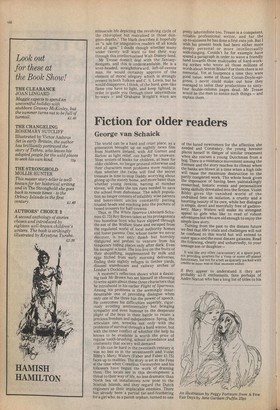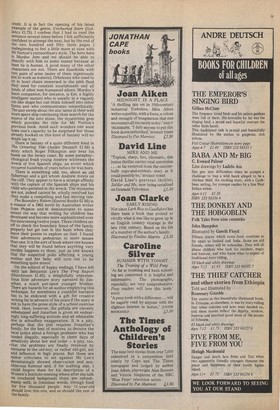Fiction for older readers
George van Schaick
The world can be a hard and cruel place, as a generation brought up on nightly news film from Northern Ireland, with Alf Garnet and Barlow as light relief, can hardly be unaware. Most writers of books for children, at least for older children, no longer pretend otherwise and their characters meet problems more realistic than whether the twins will find the secret treasure in time to stop Daddy worrying about giving up the stately home, and more basic than whether young Jenkins, batting at number eleven, will make the ten runs needed to save the school from dishonour. The adult population no longer consists of infallibly wise parents and benevolent uncles constantly patting tousled heads and reaching into the pockets of tweed trousers for half-crowns.
Thus, in The White Sparrow (Abelard-Schuman £1.75) Roy Brown takes as his protagonists two homeless boys who have slipped through the net of the Welfare State and escaped from the regulated world of local authority homes and foster parents. One, whose name we never discover, is not only dumb but horribly disfigured and prefers to venture from his temporary hiding places only after dark. Even his mongrel is lame. The trio live on the fruits of their shoplifting, supplemented by milk and eggs filched from early morning deliveries, finding their nightly refuges in timber yards, disused warehouses and railway arches of London's Dockland, A moment's reflection shows what a daunting task Mr Brown has set himself in choosing to write again about these three characters that he introduced in his earlier Flight of Sparrows. Among his problems is the seemingly insurmountable one of providing dialogue when only one of the three has the power of speech. He overcomes his difficulties superbly, rigorously avoiding sentimentality but bringing sympathy and even humour to the desperate plight of the boys in their battle to retain a precious freedom and independence. Sprog, the articulate one, wrestles not only with the problems of survival through a hard winter, but with the inner conflict of whether the help he knows to be available is worth the price of regular tooth-brushing, school attendance and conformity that society will demand.
If life can be hard in the twentieth century it was no less so in the seventeenth and Violet Bibby's Many Waters (Faber and Faber £1.75) faces up to realities. The story is set in the Fens at the time when Cornelius Vermuyden and his followers have begun the work of draining them. The locals see in this development a threat to their way of life, no less dramatic than North Sea oil installations now pose to the Scottish Islands, and they regard the Dutch engineers as their implacable enemies. There has already been a partial tar-and-feathering for a girl who, as a parish orphan, turned to one of the hated newcomers for the affection she needed and Constancy, the young heroine places herself in danger of similar treatment when she rescues a young Dutchman from a bag. There is a resistance movement among the Fenmen and the story reaches its climax when the banks are blown at a time when a high tide will cause the maximum destruction to the partly completed work. The whole book gives the impression of having been painstakingly researched, historic events and personalities being skilfully dovetailed into the fiction. Violet Bibby gives the vanished world of the undrained fens an isolation, a cruelty and a haunting beauty of its own, while her dialogue is simple, direct and mercifully free of gadzookery, Many Waters will make its strongest appeal to girls who like to read of robust adventures but who are old enough to enjoy the simple love story.
Turning from the past to the distant future we find that life's trials and challenges will not be confined to this world but will extend to outer space and the most distant galaxies. Read the following, clearly and unhurriedly, to your teenage son or daughter—
It was like any other caravansary at a space port, not providing quarters for a Veep or some off-planet functionary, but not for a belt as sparsely packed with credits as mine was at that moment either.
If they appear to understand it they are probably sci-fi enthusiasts, fans perhaps of Andre Norton who has a long list of titles to his
credit. It is in fact the opening of his latest example of the genre, Uncharted Stars (Gollancz £1.75). I confess that I had to read the sentence several times before I felt sufficiently confident to attempt the next, but by the end of the two hundred and fifty three pages I vvabeginning to feel a little more at ease with Mr Norton's extraordinary style. The hero here IS Murdoc Jern and we should be able to Identify with him to some extent because at least he is human. A good many of the other characters are not. There are lizardoids with two pairs of arms (some of them ingeniously Put to work as waiters), Orbsleans who need to Sit in bowl chairs immersed in the pink fluid they need for constant nourishment and all kinds of other non-humanoid aliens. Murdoc's boon companion, for instance, is Eet, a highly intelligent mutant who is usually in a vaguely cat-like shape but can think himself into other forms and who communicates telepathically. The pair sweep about the star lanes in their well worn space ship continuing their search for the source of the zero stone, the mysterious gem Which provides the title for Mr Norton's previous book. Amid such wonders one soon loses one's capacity to be surprised but those already hooked on this kind of fantasy will no doubt lap it up. There is fantasy of a quite different kind in The Ormering Tide (Andre Deutsch £1,50) a story which Roger Pilkington sets near his home on the Jersey coast. By some paraphsychological freak young Andrew witnesses the wreck of five Spanish ships, an event which occurred hundreds of years before he was born.
There is something odd, too, about an old fisherman and a girl whom Andrew meets on the cliff. They appear to have a strange affinity With the captain of the Spanish ships and his child who perished in the wreck. The mysteries are not, indeed cannot be, wholly resolved but they make a compelling and fast moving tale.
The Boundary Riders (Kestrel Books £1.95) is a reissue of a 1962 novel by Australian writer Joan Phipson and it demonstrates to some extent the way that writing for children has developed and become more sophisticated over the intervening twelve years. Three children set off to check the boundary fence of the family Property but get lost in the bush when they leave their ponies to explore on foot. I found their adventures pedestrian in more senses than one. It is the sort of book where one knows that they will be found before anything very terrible happens to them, just as one knows that the suspected polio affecting a young mother and her baby will turn out to be something quite minor.
On the subject of happy endings, I have left until last Benjamin Lee's The Frog Report (Hutchinson £1.85), a delightfully unpretentious little adventure story narrated by Jonathan, a much put-upon younger brother. There are hazards for an author employing this technique, for sometimes a youthful narrator has to be endowed with a gift for creative writing far in advance of his years if the story is not to have the prose style of a school exercise book. Here, however, the pitfalls are cleverly Sidestepped and Jonathan is given an endearingly long-suffering attitude and an admirable line in schoolboy exaggeration. It is a pity, Perhaps that the plot requires Jonathan's family, for the best of motives, to deceive the local police about a foreign professor who has landed illegally, especially in these days of sensitivity about law and order — a pity, too, 'that the problems are finally resolved by recourse to the old-boy, or rather old-girl, net and influence in high places. But these are minor criticisms to set against Mr Lee's devastatingly shrewd observation and mischievous humour and, if for nothing else, I could forgive them for his description of a Women's Institute meeting where after the talk On crocheted bedspreads there are refreshments with, in Jonathan words, enough food for five thousand people. Any 11-year-old should love this one, and so should the rest of the family.



































































 Previous page
Previous page